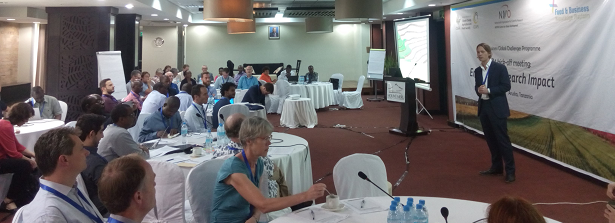Scaling Climate Smart Agriculture in East Africa

“We need to stretch ourselves and our outcomes, such that our Climate Smart Agriculture research has an outreach to 7 million farmers, rather than the 350 per project that we are focusing on initially”, commented Bruce Campbell, director of the CGIAR programme on Climate Change, Agriculture and Food security (CCAFS). In the fourth call of the Food & Business Global Challenges Programme (GCP) eight research projects were funded on scaling of Climate Smart Agricultural practices. The call is a first stepping stone towards the Netherlands’ partnership with the CGIAR. The call is developed and implemented in collaboration with CCAFS and projects are aligned with ongoing CCAFS projects to research approaches for scaling.
The consortia implementing the eight projects met on February 6 and 7 in Arusha, Tanzania in a kick-off meeting, to identify cross-linkages and develop joint pathways to outcomes. Further participants included representatives of the wider regional and global CCAFS programme, as well as from Ministries in East Africa and the Netherlands and several key regional network organisations.
Understanding scaling Climate Smart Agriculture
The eight research projects funded in the fourth GCP call (GCP-4) are just starting off their activities. The projects are focusing on how to scale practices in Climate-Smart Agriculture in East Africa. Amongst their focus areas are enabling mechanisms from a perspective of enhancing inclusiveness of value chains and business models or innovative finance mechanisms, for example for dairy and seeds chains. Key is the enhancement of the enabling environment for Climate Smart Agriculture, which should address the combined challenges of climate change and food and nutrition insecurity. The meeting provided ample opportunity for identifying linkages across projects, which will feed into efforts across projects. For example, three research projects on the dairy sector explored the complementarity of their work and how they will jointly aim to achieve behavioural change in the institutional context in order to leverage Low Emission Development and improve understanding of inclusiveness of business models. A similar exercise was conducted by the projects working in innovative finance development, where change is aimed with related development actors such as Care Tanzania or the CSA Youth Network to engage youth.
Linking to regional CSA initiatives
In order to strengthen the strategies for achieving outcomes, other initiatives and networks in the region were mapped, with and through which the research consortia may collaborate. Insights from representatives of Ministries in three countries in the region helped understanding the policy environment, while exchanges with regional networks, for example the regional farmers’ federation, generated a useful ‘outsiders’ view on the research-impact pathways. As follow up, CCAFS, NWO-WOTRO and the F&BKP will provide guidance and support, to align the GCP-4 activities with other (Dutch) initiatives to enhance food and nutrition security in the region.
A joint action plan
The meeting generated input for an action plan for activities across projects in the context of the wider East African, CCAFS and Dutch networks. Such as guidance to projects on engagement with policy, in the stage of policy development as well as on policy implementation pathways. The need for mapping of themes, conceptual approaches as well as levels of analysis was expressed, which will be guided by the CCAFS East Africa team. Several project representatives committed to writing blogs, publishing articles and join in on an upcoming special issue on Inclusive Business to which a range of GCP and ARF projects may contribute. Further, development of the Theory of Change for the portfolio as well as at the project levels was agreed on. Continued engagement was ensured through the composition of a coordination team and future events. The meeting was organised in a collaborative effort between CCAFS, NWO-WOTRO and the Food & Business Knowledge Platform.
_ _ _
Food & Business Research
The Food & Business Global Challenges Programme (GCP) and the Applied Research Fund (ARF) are subsidy schemes of the Dutch Ministry of Foreign Affairs (MoFa), implemented by NWO-WOTRO Science for Global development.
The Food & Business Knowledge Platform is an initiative of MoFa for stakeholders in the field of Food and Nutrition Security to co-create, exchange and use knowledge. The fourth call of GCP is funded and implemented in collaboration with the CGIAR programme on Climate Change, Agriculture and Food security (CCAFS). For more information on the GCP and ARF projects see the Food & Business Knowledge Platform website.






To help the small cooperatives farmers financially, so we need more funding support from development country to tackle the problems of climate change
Thank you for your comment. We acknowledge you highlight the need for farmers and their cooperatives to have access to climate finance. This is a comment often heard in our agrifood networks of academics, civil society, private sector, and banks. If you want to know more about this please check http://momo4climate.org/ and http://www.inclusivefinanceplatform.nl/home
F&BKP Office team
I think there is need to create awareness among farmers on how to adapt to climate change for now as we slowly introduce them to the mitigation options simply because these farmers are result oriented that is they will quickly adopt any practice as long as it gives immediate results.
In my country Uganda, awareness is lacking. Most of the farmers are being told to plant trees (which is good from the mitigation point of view) but “not reducing the climate change impacts” immediately as they expect and perceive it according to the agricultural extension workers.
Thanks for the work so far done.